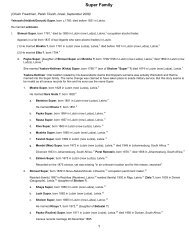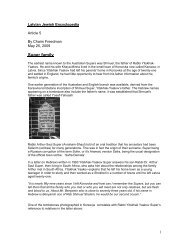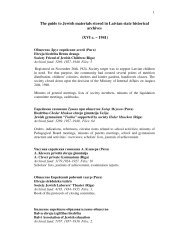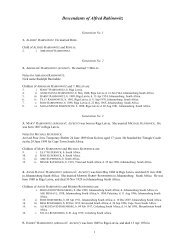Small Riga Ghetto
Small Riga Ghetto
Small Riga Ghetto
You also want an ePaper? Increase the reach of your titles
YUMPU automatically turns print PDFs into web optimized ePapers that Google loves.
259<br />
a small printing workshop. The Germans were trying to "defeat" the English<br />
by producing colossal amounts of counterfeit English banknotes there so that<br />
they could cause a devaluation of the English currency.<br />
In the evenings there was the usual roll call. We stood lined up in our small,<br />
narrow courtyard. There was no supper, so we had to go to bed hungry. It was<br />
18 April 1945, my birthday. My life passed before me like a dream; painfully,<br />
I thought of my whole family and regretted that I was still alive at all, that I<br />
alone had survived and had not shared my relatives' fate.<br />
We sat down on the floor of our barrack, so close together that if you<br />
wanted to go outside in the dark it was impossible to find a way out. There<br />
was not enough room for everyone, but the crafty guards found a solution.<br />
Large, long tables were brought in, and one group would sleep on top of them<br />
while another group lay underneath. These were the clever inventions of<br />
trained sadists. Every day new people were brought to join us. The only place<br />
left to put them was the courtyard. Fortunately, it was already getting warmer.<br />
The following evening we received our first rations, which meant we hadn't<br />
had anything to eat for nearly two days. We were very weak, dragging our<br />
feet as we walked.<br />
On the third day there were more new arrivals. This made us suspect that<br />
our liberators were very close by. By then I was no longer interested in anything;<br />
all I wanted was to eat. That night, planes dropped a number of bombs<br />
near the camp. They spared us again, for they knew that here tens of thousands<br />
of people were waiting to be liberated. At four in the morning a general<br />
restlessness became evident in the entire camp. A German SS man who knew<br />
Polish came to us. He announced, "The camp will be evacuated in an unspecified<br />
direction; rows must be formed five abreast, a thousand men to a column;<br />
food for four days will be handed out. Everyone must take his place in a column<br />
according to his nationality. Those who are sick or believe they won't<br />
survive a long march can stay here. They will be collected and taken away<br />
later on."<br />
What to do? I was weak but I didn't want to stay with the sick people under<br />
any circumstances, for they would certainly be "taken care of". I decided to<br />
muster up the last of my strength and go along. Next I had to think about<br />
which column I ought to join. It seemed dangerous to go with the Jews, for<br />
they would certainly share the fate of the sick. Since I spoke Polish, I thought<br />
the best course for me would be to join the Polish column. So, together with a<br />
few other Jewish comrades, I smuggled myself into their ranks. The Poles noticed<br />
this and tried to throw me out. I explained in the purest Polish that I was










